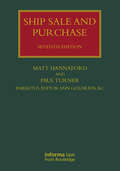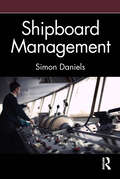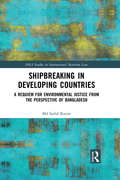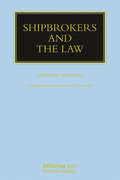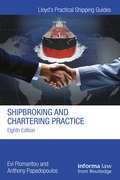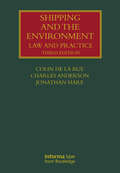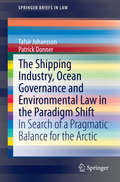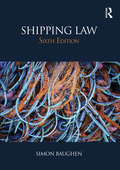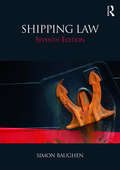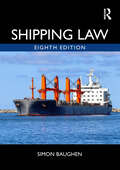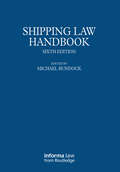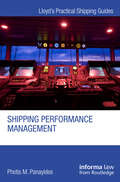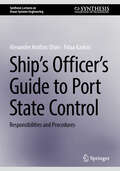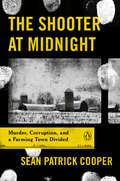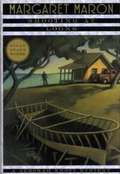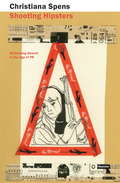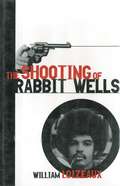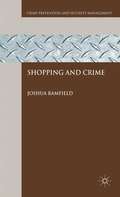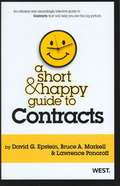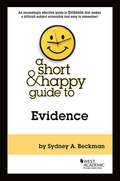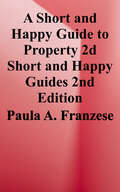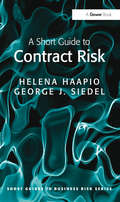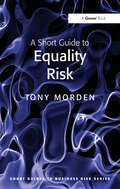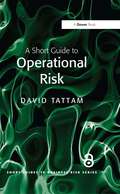- Table View
- List View
Ship Sale and Purchase (Lloyd's Shipping Law Library)
by Iain Goldrein Matt Hannaford Paul TurnerShip Sale and Purchase is the essential working guide for anyone involved in the business of making ship sale and purchase agreements and also in the resolution of disputes arising out of such agreements. The seventh edition of Ship Sale and Purchase contains a detailed clause-by-clause analysis of SHIPSALE 22, the new standard form Memorandum of Agreement for ship sales and purchases published by BIMCO in 2022. This clause-by-clause analysis is supplemented by commentary on the corresponding provisions of the other leading standard forms used in the global shipping markets - SALEFORM 2012 (the latest version of the longstanding standard form produced by the Norwegian Shipbrokers' Association), SINGAPORE SHIP SALE FORM 2011 and NIPPONSALE 1999 - and the main differences between these forms and SHIPSALE 22. This edition of Ship Sale and Purchase also contains a comprehensive description of the many ways in which standard form agreements may be modified, through amendments to the printed terms and the use of additional clauses, to suit the particular requirements of the parties to individual transactions. In addition, it analyses relevant decisions of the English courts and arbitration tribunals and explains the implications of these decisions for ship sale and purchase transactions. The seventh edition also includes commentary on changes in working practices such as the use of electronic signatures, the practice of "remote" closings, payment mechanisms and the impact of sanctions and anti-corruption legislation. As with previous editions, the seventh edition of Ship Sale and Purchase seeks to provide legal analysis, market insight and practical guidance for all those involved in the business of buying and selling second-hand ships.
Shipboard Management
by Simon DanielsShipboard Management supports students undertaking qualification at all stages of maritime training, enhancing and developing knowledge and understanding of the key issues in the Merchant Shipping (Training and Certification) Regulations 1997, as subsequently amended by the 2015 Regulations and other legislation.Informed by real-world experience of commercial shipboard operations, Shipboard Management offers an essential study guide addressing the issues which are most frequently confronted in the context of ship management. It is designed to foster the ability to analyse and apply the dynamics of the legal and operational structures in which the shipboard management team must engage in merchant vessel operations. Students will progress through increasingly difficult levels of learning activity in order to develop problem-solving abilities. The text focuses on the application of skills and techniques that are fundamental to commercial shipping and that meet the demands of the Merchant Shipping (Standards of Training, Certification and Watchkeeping) Regulations.This will be essential reading for all students and candidates on MCA-accredited Deck training courses, and for seafarers wishing to apply for Certificates of Equivalent Competency. It is also a key reference for professionals in ship-owning and management companies, and for maritime lawyers.
Shipbreaking in Developing Countries: A Requiem for Environmental Justice from the Perspective of Bangladesh (IMLI Studies in International Maritime Law)
by Md Saiful KarimThis book explores the process of shipbreaking in developing countries, with a particular focus on Bangladesh. In the past, shipbreaking (the disposal of obsolete ships) was a very common industrial activity in many developed countries. However, due to stringent domestic environmental and labour laws it is almost impossible for the increasing number of vessels to be disposed of domestically, and now developing nations including Bangladesh, China, India, Turkey and Pakistan regularly participate in this activity. The shipbreaking yards in these countries are not only detrimental to the marine and coastal environment but also represent significant health hazards to local people and workers. Given the global importance of the issue, an effective legal and institutional framework for a sustainable operation of the shipbreaking industry is desperately needed. Sitting at the intersection of three distinct fields – environmental justice, international environmental law and international maritime law – this book offers an innovative take on the issues surrounding the shipbreaking process. Drawing on the case study of Bangladesh due to its prominence in the shipbreaking industry, the author implements an environmental justice framework to examine the issues of sustainability surrounding shipbreaking, and analyses the relationship between social development, economic development and environmental protection. Maritime perspectives of environmental justice will also be highlighted through a discussion of the International Maritime Organization’s role in the implementation of the Hong Kong Convention in developing countries. This book will be of great interest to scholars of environmental justice, international maritime law and international environmental law.
Shipbrokers and the Law
by Andrew JamiesonThis text provides an explanation of the responsibilities and liabilities of the shipbroker, both in direct contact with principles and as part of a chain of other brokers. Highlighting legal questions arising from ways in which the broker's business is done, issues addressed in this book include potential legal liabilities as well as common negligence claims. The book also deals with the shipbroker's entitlement to commission and the problems associated with litigation in this area. It is suitable for ship owners, charterers, agents and marine consultants, as well as brokers.
Shipbroking and Chartering Practice (Lloyd's Practical Shipping Guides)
by Evi Plomaritou Anthony PapadopoulosNow in its eighth edition, this classic text is a first point of reference for anyone looking to obtain an understanding of chartering and shipbroking practice. It provides hands-on, commercially-focused explanations of chartering business and invaluable advice on how the shipping market operates across a broad range of topics. The authors also deal expertly with the legal, financial, operational and managerial aspects of chartering, offering numerous case studies which clearly link theory to practice. This new edition has been fully revised and updated to reflect the current trends in chartering practice, legal developments and standard forms of charterparties. New to this edition: Enriched with practical examples covering crucial aspects of chartering and shipbroking business, such as voyage estimations, freight conversions and tanker calculations. New material on day-to-day laytime principles, including "Laytime Definitions for Charterparties 2013", associated commentary and relevant examples. Shipping Marketing as a modern tool of improving chartering and shipbroking business. Expanded coverage of the economic background of chartering, including markets, vessels, cargoes, trades and fixtures. Freight rates for all vessel types from 1980 to 2015. Updated review of well-known standard charterparty documents (including NYPE 2015), together with clauses and wordings commonly applying to various charter types. Analytical glossary containing typical terms and abbreviations used in chartering negotiations. This book is an essential guide for practitioners in private practice and in-house for shipowners and cargo houses, as well as those studying shipbroking and chartering.
Shipping and the Environment: Law and Practice (Lloyd's Shipping Law Library)
by Colin De La Rue Charles B Anderson Jonathan HareFrom the time it was first published in 1998, Shipping and the Environment has been the leading text on international and US law and practice in this field. Written by renowned legal and insurance practitioners with over 100 years of combined specialist experience, including first-hand knowledge of many major incidents, it is not only a comprehensive reference work but an abundant source of introductory material and practical insights, all explained with a clarity appreciated by lawyers and non-lawyers alike in a broad international readership. While updating its core subjects of pollution from ships, wreck removal and dumping at sea, this enlarged text extends into other modern areas including pollution from offshore operations after Deepwater Horizon, plastics released into the sea, recycling of vessels, polar operations, and the fast-changing restrictions on carbon emissions from ships, as well as safety threats such as cyberattacks, terrorism and modern forms of piracy. With a highly readable introductory chapter amounting to a book within a book, this is a volume of great importance to all whose work or studies are concerned with marine environmental affairs, whether in government, international bodies, industry, technical organizations, the professions, environmental NGOs, the academic world or other walks of life.
The Shipping Industry, Ocean Governance and Environmental Law in the Paradigm Shift
by Tafsir Johansson Patrick DonnerThis book examines the corpus of status quo environmental legal regime, geographical issues and redundant "stakeholder claims," which persist in the Arctic. It examines multifarious theories relating not only to conflicting and opposing interests, but also to parties to whom the shipping industry should be accountable. The unique aspect of this book is the Corporate Social responsibility analysis pertaining to the Arctic and alternatives that strike a balance between the increased commercialization of the shipping industry and the laws and concepts of ocean governance. The book relevantly puts forward the concept of "ocean governance" and to what extent it can be addressed in terms of the Arctic. What distinguishes this book from others is the fact that it is not limited to examining the effects of climate change and how it is reshaping the way scholars assume the Arctic will be in the near future. Rather it creates a transparent nexus between opposing claims and increasing commercial interests and proceeds to scrutinize the efforts of the Arctic Council and individual Arctic coastal states. In this context, the book follows a given equation based on initial theories and how the opposing claims and increasing commercialization side of the equation can be balanced with the appropriate legal norm. It also reflects on the critical aspects of "hard law and soft law" which are two opposite ends of the legal pole and core elements of any legal spectrum. The book, after reflecting on those two elements, finally proposes a new Arctic legal regime, which is intricate and detailed and is basically a hierarchy based on logic and reasoning. In doing so, it imports a pristine theory for a pristine territory.
Shipping Law
by Simon BaughenIn this well-established textbook, Simon Baughen expertly covers the whole spectrum of English shipping law, placing the highly specialised rules of shipping in a commercial context and relating them to the general principles of contract and tort law. The book's accessible narrative and useful glossary of key terms will particularly benefit students new to Shipping Law or from non-law backgrounds. In-depth commentary on judicial decisions and well-balanced coverage and analysis of recent and key cases, such as The New Flamenco, The Ocean Victory, and The Kos, provide an up-to-date reference for all students on Shipping Law courses. The comprehensive overview of topics also ensures that the book is ably suited to course use, including discussion of such areas as: Bills of lading Charterparties Salvage Marine Pollution Arbitration Accidents and collisions Fully updated throughout, this sixth edition provides an invaluable source of reference and will be of use to both students and to those in practice.
Shipping Law
by Simon BaughenIn this well-established textbook, Simon Baughen expertly covers the whole spectrum of English shipping law, placing the highly specialised rules of shipping in a commercial context and relating them to the general principles of contract and tort law. The book’s accessible narrative and useful glossary of key terms will especially benefit students new to shipping law or from non-law backgrounds. In-depth commentary on judicial decisions and well-balanced coverage and analysis of recent and key cases, such as The Longchamp , Spar Shipping v Grand China Logistics , The Maersk Tangier , provide an up-to-date reference for all students on Shipping Law courses. The comprehensive overview of topics also ensures that the book is ably suited to course use, including discussion of such areas as: Bills of lading Charterparties Salvage Marine Pollution Jurisdiction Choice of Law Arbitration Accidents and collisions Fully updated throughout, this seventh edition provides an invaluable source of reference and will be of use to both students and to those in practice.
Shipping Law
by Simon BaughenIn this indispensable textbook, Simon Baughen expertly covers the whole spectrum of English shipping law, placing the highly specialised rules of shipping in a commercial context and relating them to the general principles of contract and tort law. The 8th edition is brought fully up to date, covering all the relevant legal implications following on from Brexit. In-depth commentary on judicial decisions and well-balanced coverage and analysis of recent and key cases provide an up-to-date reference for students on shipping law courses. All key topics are comprehensively covered, including bills of lading, charterparties, salvage, marine pollution, jurisdiction, choice of law, arbitration, and accidents and collisions. Continuing significant and noteworthy developments in shipping law are explored in this new edition, such as the introduction into the House of Lords in October 2022 of the Electronic Trade Documents Bill. The field of international conventions has also seen several changes since the previous edition. Shipping Law provides an invaluable source of reference, both for students and those in practice. The book’s accessible narrative and useful glossary of key terms will especially benefit students new to shipping law or from non-law backgrounds.
Shipping Law Handbook
by Michael BundockAnyone who deals with shipping disputes requires access to a mass of source materials. These include international conventions, statutes and statutory instruments, arbitration rules, and the most commonly encountered bills of lading, charterparties, insurance clauses, guarantees and other contracts. Details of the parties to the international conventions are also required. The Shipping Law Handbook collects all this material in one convenient and easy-to-use volume. <P><P>The Handbook deals with the following areas: <li>arrest, jurisdiction and applicable law; <li>arbitration; <li>limitation of liability; <li>cargo claims; <li>collision; <li>marine insurance; <li>oil pollution; <li>salvage, toward and general average; <li>standard forms. <P><P>Each section has an introduction which gives a brief overview of the materials included, setting them in their context, and noting probably future developments. <P><P>The Handbook has been fully revised for this sixth edition. New items include: the European Judgments Regulation (Recast) 2012, the LMAA Terms 2017, the Insurance Act 2015, the York-Antwerp Rules 2016, the Inter-Club Agreement 1996 (amended 2011), Barecon 2017, Congenbill 2016, NYPE 2015 and updated lists of parties to international conventions. <P><P>The Handbook is a highly practical work, which anyone involved in shipping will wish to keep conveniently to hand. It is an essential reference work for shipping lawyers, arbitrators, P&I Clubs and their correspondents, shipowners, ship masters, agents and brokers.
Shipping Performance Management (Lloyd's Practical Shipping Guides)
by Photis M. PanayidesIn the dynamic and volatile shipping industry, effective performance management is essential to an organization’s success. This book is a practical guide to developing a holistic and comprehensive performance measurement and management system at managerial level in shipping organisations. Companies in the shipping industry must perform well across many facets of the organization to satisfy an array of demands and obligations arising from a complex environment of customers, partners, competitors and regulators. This book shows how companies can develop systems to effectively gauge and monitor organizational performance, including among others strategic, economic, environmental, social and operational performance. Topics covered include: tools and approaches for measuring performance; strategy and the use of the Balanced Scorecard; the mapping of shipping business strategy; the development of KPIs; cascation; and implementation. This guide to performance measurement and management is an important resource for managers in the shipping and maritime transport industry, as well as those aspiring to hone their skills in the art of performance management and decision-making.
Ship’s Officer’s Guide to Port State Control: Responsibilities and Procedures (Synthesis Lectures on Ocean Systems Engineering)
by Alexander Arnfinn Olsen Fidaa KarkoriThis book is a comprehensive guide to Port State Control (PSC) responsibilities and procedures, offering invaluable insights for maritime professionals. Through this book, readers will learn the intricacies of PSC inspections, contraventions, and detentions, as well as discharge requirements under MARPOL.The chapters cover topics such as the Port State Control regime, conduct of PSC officers, detention of vessels, and detailed inspections for vessel structural and equipment requirements. The authors provide an expert analysis of investigations and inspections under MARPOL Annexes I and II, control of operational requirements, and certification of seafarers. Particular attention is given to the ISM Code and PSC procedures related to LRIT.This essential resource is designed for engineers, maritime professionals, and students in merchant ship operations, maritime law, and port procedures. It offers a clear and unambiguous structure central to safety in safety-critical industries. Whether you are an academic or a practitioner in the field, this book will enhance your understanding of PSC responsibilities and procedures.
The Shooter at Midnight: Murder, Corruption, and a Farming Town Divided
by Sean Patrick CooperThe harrowing true story of a cold-blooded murder and the campaign to bring justice to a suffering Midwestern townOn a November night in 1990, Cathy Robertson is murdered in her home outside Chillicothe, Missouri. After law enforcement conduct a haphazard investigation, the sheriff&’s office puts the case in the hands of a Kansas City private eye with his own agenda. In a close-knit town still reeling from the aftereffects of the farming crisis, friends and neighbors abruptly fracture into opposing camps. Mark Woodworth, a Robertson family neighbor, eventually receives four life sentences for a crime that a growing group of local supporters believe he didn&’t commit.In a surprising, dramatic narrative that spans decades, Mark&’s family turns to Robert Ramsey, an attorney willing to take on a corrupt political machine suppressing the truth. But the community&’s way of life is irrevocably damaged by the parallel tragedies of the farming crisis and Cathy&’s unsolved murder, in a gripping story about the fault-lines of a fracturing America that continue to cut across the farm belt today.
Shooting at Loons (Deborah Knott #3)
by Margaret MaronWe follow Judge Deborah Knott to the state's lush Crystal Coast, where expensive yachts ride at anchor...and murders wash in on the "Down East" tide. Asked to sit in for a hospitalized judge in gracious old Beaufort, Deborah hopes to spend a restful week at her cousin's nearby Harkers Island cottage; but her very first clamming expedition turns up the corpse of a well-known fisherman in the shallow waters. Discovering the body puts her right in the middle of the fight between the locals who have long made their living from the sea and the new tide of well-to-do "dingbatters": weekenders and land developers who view the coast as their personal playground and gold mine. Deborah soon realizes that the centuries-old way of life in this isolated corner of the South is as endangered as loons and sea turtles, and the fisherman's murder is clearly tied to the coming changes. On the bench and off, she can feel the rage and fear and greed these changes arouse. Even so, sipping her bourbon in the fresh salt air proves beneficial for Deborah's soul, and life at the beach takes a definite upswing when she meets a game warden who's hunting for loon poachers. Not until a second murder occurs and a lover from her past becomes a suspect does Deborah realize she's up to her own neck in intrigue - and dangerously close to a killer...
Shooting Hipsters: Rethinking Dissent in the Age of PR
by Christiana SpensIn an age of PR, public protest and other forms of dissent have lost their meaning and impact. The intense media interest in rioting and political violence, as well as an existing obsession with youth culture, have led to an over-saturation and misrepresentation of what these movements are about. Political protest has become a pantomime where activists are always villains, and therefore the politics of these groups are routinely ignored. By identifying the ways in which publicity has helped and hindered a wide range of movements, Shooting Hipsters will find out the ways in which dissenting groups can thrive and survive in a media-saturated age, as well as describing the common ways that they can be undermined.
The Shooting of Rabbit Wells: A White Cop, a Young Man of Color, and an American Tragedy
by William LoizeauxWhat put a white cop and a black youth on a tragic collision course? On a frigid winter’s night in 1973, William "Rabbit” Wells, a young man of mixed race, was shot and killed by a white policeman named William Sorgie outside a bar. The shooting stunned the placid, prosperous communities of New York. For twenty-five years author William Loizeaux, who went to high school with Rabbit, hasn't been able to let go of a story that struck at the core of the place that he, along with Rabbit and Sorgie, called home. With clear-eyed compassion and unsparing honesty, The Shooting of Rabbit Wells recreates the lives of both victim and killer and the forces that brought them together. By giving us the life of Rabbit Wells, Loizeaux makes us understand-and feel-how unacceptable and irreparable his loss was, and how deeply the bullet that killed him is lodged in the American identity.
Shooting Straight: Telling the Truth About Guns in America
by James J. Baker Wayne LapierreOpposed to gun control.
Shopping and Crime (Crime Prevention and Security Management)
by Joshua A. N. Bamfield<p>For many people ‘going shopping’ is seen as one of life’s great pleasures. It combines the excitement of a bargain, the thrill of the chase, new experiences, three-dimensional mental arithmetic, disappointments, successes, the pleasures of varied interactions with other people, the chance to renew old acquaintances, manual labour and, often, exhaustion. It is thought to be heavily gendered, with males being more utilitarian, focusing only on buying particular items (or refusing to engage in shopping), and females being as interested in the processes and often more wide-ranging in the product categories they will buy on a shopping expedition (Woodruffe, 1997; Miller, 2008). <p>t the same time, retailing is also a major crime scene, with retailers being the most targeted victims of crime. There are many times more crimes against retailers than domestic burglaries, robberies or car crime. The total stolen is also higher. Retailers in the United Kingdom lost goods and cash costing £3,664 million ($5.9 billion) to retail crime in 2010 (Bamfield, 2010a) and according to a sample survey by the British Retail Consortium (BRC) caught almost one-half million people stealing from them (BRC, 2011a). In the United States the total stolen was estimated to be as high as $32.6 billion.</p>
A Short and Happy Guide to Contracts
by Bruce A. Markell David G. Epstein Lawrence PonoroffThis efficient and exceedingly effective guide to Contracts will help you see the big picture. The authors focus on making the key concepts of contract law, and the relationship among those concepts, easier to understand and retain. The authors have also infused the book with humor, believing there is nothing inconsistent between a rigorous academic experience and having a little fun. Each of the authors is nationally-renowned law teacher who has taught Contracts for decades. Based on that experience, in this book they have set forth understandable techniques for mastering the law governing each critical aspect of the contract relationship, including, contract formation (offer and acceptance), enforcement (consideration and defenses), interpretation, performance, breach, and remedies. Learn more about this series at ShortandHappyGuides. com.
A Short and Happy Guide to Evidence (Short and Happy Guides)
by Sydney BeckmanA Short and Happy Guide to Evidence takes a challenging subject and breaks it into manageable pieces that are easy to understand and digest. Using practical examples and humor, this book takes you through the most difficult, and most often tested, rules. After reading this book you will finally understand the Hearsay Rule. Flowcharts and graphics will assist the reader in a comprehensive understanding of the Federal Rules of Evidence and how they interact with each other.
A Short and Happy Guide to Property (Short and Happy Guides)
by Paula A. FranzeseThe second edition of this efficient and effective guide takes difficult subject matter and makes it accessible and easy to remember. Professor Paula Franzese, a nationally renowned teacher and scholar, sets forth understandable techniques for mastering estates in land and future interests (including the dreaded rule against perpetuities), concurrent estates, landlord-tenant law, servitudes, land transactions, recording system, zoning, and eminent domain. <p><p>This expanded edition also includes the top ten themes of property law, the rule of capture, and the law of finders. Learn from this nine-time recipient of the Professor of the Year Award and become a property connoisseur!
A Short Guide to Contract Risk (Short Guides to Business Risk)
by Helena Haapio George J. SiedelSavvy managers no longer look at contracting processes and documents reactively but use them proactively to reach their business goals and minimize their risks. To succeed, these managers need a framework and A Short Guide to Contract Risk provides this. The foundation of identifying and managing contract risk is what the authors call Contract Literacy: a set of skills relevant for all who deal with contracts in their everyday business environment, ranging from general managers and CEOs to sales, procurement and project professionals and risk managers. Contracts play a major role in business success. Contracts govern companies' deals and relationships with their suppliers and customers. They impact future rights, cash flows, costs, earnings, and risks. A company's contract portfolio may be subject to greater losses than anyone realizes. Still the greatest risk in business is not taking any risks. Equipped with the concepts described in this book, business and risk managers can start to see contracts differently and to use them to find and achieve the right balance for business success and problem prevention. What makes this short guide from the authors of the acclaimed Proactive Law for Managers especially valuable, if not unique, is its down-to-earth managerial/legal approach. Using lean contracting, visualization and the tools introduced in this book, managers and lawyers can achieve legally sound contracts that function as managerial tools for well thought-out, realistic risk allocation in business deals and relationships.
A Short Guide to Equality Risk (Short Guides to Business Risk)
by Tony MordenA Short Guide to Equality Risk analyses the concepts, theories, and issues associated with the implementation in organisations and the service environment of an Equality, Diversity, and Discrimination (EDD) Agenda. Whether from a business, political, social, legal or medical view, the risks of failure of EDD compliance are escalating, be it in terms of cost, the possibility of damage to reputation, or the potential for loss of government or public sector contracts. Using the insights and specialised medico-legal knowledge he has acquired in the course of successfully defending his own rights, Tony Morden examines the subject from leadership, governance, management, opportunity, and performance-oriented perspectives. By using case studies and drawing on a growing body of international experience, the author analyses components of an EDD Agenda: equality, diversity, opportunity, and discrimination; and examines issues and dilemmas associated with implementing such an agenda. He offers a strategic and performance-oriented overview of the issues of leadership, prioritisation, management process, managing architectures, and the application of performance and risk management concepts. Written from a scholarly perspective, but in a practitioner-oriented and reader-friendly manner, this addition to the series of short guides to business risk provides a credible, strategic, and implementation-based overview of what is becoming a critically important, politically sensitive, and high risk subject.
A Short Guide to Operational Risk (Short Guides to Business Risk)
by David TattamThere is a growing awareness across both public and private sectors, that the key to embedding an effective risk culture lies in raising the general education and understanding of risk at every level in the organization. This is exactly the purpose of David Tattam's book. A Short Guide to Operational Risk provides you with a basic yet comprehensive overview of the nature of operational risk in organizations. It introduces operational risk as a component of enterprise wide risk management and takes the reader through the processes of identifying, assessing, quantifying and managing operational risk; explaining the practical aspects of how these steps can be applied to an organization using a range of management tools. The book is fully illustrated with graphs, tables and short examples, all designed to make a subject that is often poorly understood, comprehensible and engaging. A Short Guide to Operational Risk is a book to be read and shared at all levels of the organization; it offers a common understanding and language of risk that will provide individual readers with the basis to develop risk management skills, appropriate to their role in the business. The Open Access version of this book, available at http://www.taylorfrancis.com, has been made available under a Creative Commons Attribution-Non Commercial-No Derivatives (CC-BY-NC-ND) 4.0 license.
